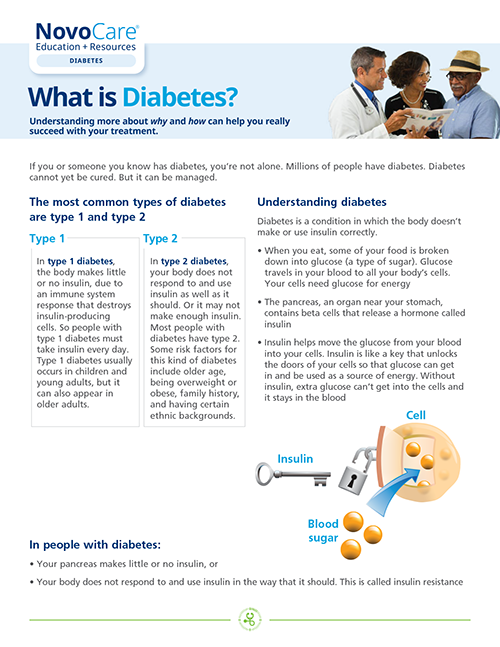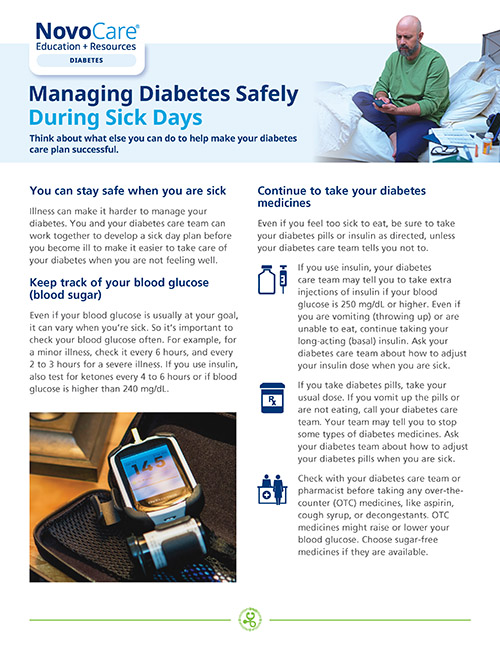

MANAGING DIABETES
Plans are good. Following them is even better.

When you’re living with type 2 diabetes, learning what you’re supposed to do comes first. These tips can help you follow through.
If you take diabetes medicine, it’s a good idea to work with your doctor to create a personal medicine plan. Starting a diabetes medicine may seem like a lot to handle. But when you know how to take it and follow the instructions, it can be more manageable.
Your plan will tell you:
- What type of diabetes medicine to take
- How much to take
- When to take it
Your plan will be based on:
- Your current blood glucoseBlood glucoseThe main sugar found in the blood, and the body’s main source of energy. level
- What, when, and how much you eat
- Your level of physical activity
- Your lifestyle
- Other medical conditions you may have
Your need for diabetes medicine may go up and down all day and depends on different things. For instance:
- You may need more medicine at meal times
- You may need less medicine when you are exercising or between meals
Your doctor will help you determine how much medicine you need. Be sure to check with him or her before you make any changes in your doses of diabetes medicine.
Download Staying on track: Your guide to tracking and monitoring your diabetes
Make the most of your plan
To get the full benefits of your diabetes medicine(s), you need to take them exactly as directed by your doctor. That can be challenging sometimes. Maybe you aren’t comfortable with pills or injections. Or you find medicine hard to fit in your daily routine. Here are some tips to help you stay on track and some ways to get past issues that many people face.

Tips for taking diabetes medicine
- Learn about what you’re taking
Get all of the information you need to take your medicine properly. Always ask your doctor if you have questions. The package insert that comes with your medicine also has a lot of information. Pay attention to:
- The name of the medicine
- The amount (dose) of medicine to take
- When to take the medicine
- Whether to take the medicine before you eat, while you’re eating, or after eating
- How to store the medicine
- What the medicine does for you
- How to tell if the medicine is working
- What to do if you have a side effect
- What to do if you miss a dose
- If you have questions, speak with your diabetes care team
Make sure you raise any issues that concern you. Speak with your diabetes care teamDiabetes care teamYour diabetes care team may include a primary care doctor, a diabetes and hormone doctor (endocrinologist), a registered nurse, a diabetes educator, a dietitian, a heart doctor (cardiologist), a foot doctor (podiatrist), an eye doctor (ophthalmologist/optometrist), a kidney doctor (nephrologist), a dentist, a pharmacist, and a mental health professional. about any problems you may face. Together you can come up with solutions that are right for you
Keep a list of the names and contact information of every member of your care team. This can include your:
- Primary doctor
- Diabetes educator
- Registered dietitian
- Heart doctor (cardiologist)
- Foot doctor (podiatrist)
- Eye doctor (either an ophthalmologist or optometrist)
- Kidney doctor (nephrologist)
- Dentist
- Pharmacist
- Mental health professional
- Get the facts
Make sure you get your information from a trusted source. Some people’s views about diabetes medicines—even insulinInsulinA hormone made by the beta cells in the pancreas that helps glucose move from the blood into the cells. Insulin is also an injectable medicine that is used to treat diabetes by controlling the level of glucose in the blood.—are based on wrong or outdated information. Always check with your diabetes care team first before making any changes to your routine.
Download Diabetes and you: Your guide to better living with diabetes
Tips on starting a new treatment
Adding or changing medicines can be challenging for many people. Here are ways you can make sure you have the right support from the beginning:
- Be patient
Treat the first couple of weeks of taking a medicine as a “trial period.” Each person can react differently to the same medicine and taking new pills or getting used to injections may take a little time. The same is true when you have to adjust to changes in your diabetes care plan. It may take your body a while to adjust to new therapy before you know how well it’s working. It also may take a few tries to get into the habit of taking your medicine. But don’t give up! It’s important.
- Stay in touch with your doctor
Tell your doctor right away about any problems you may have with taking your diabetes medicine. Your medicine plan may need to change so you can meet your blood glucose goals. Your doctor will work with you to make changes as needed.




